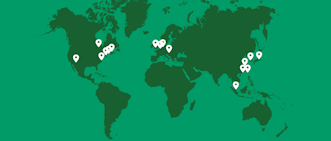
With enhanced intelligence and connectivity, automotive telematics systems and infotainment applications are increasingly complex. Today’s vehicle telematics systems provide two-way communication that sends, receives and stores information. Telematics control units connect vehicles with the outside world, enabling high speed internet access and access to car manufacturers’ entertainment and service offerings. Real time traffic information, location based services and emergency call are examples of the latest in car digital living space.
With infotainment systems, drivers can talk hands-free with Bluetooth connectivity, receive GPS route guidance, watch movies or listen to music while driving - all at the same time. With all this complexity, designers are facing more challenges than ever to balance performance with reliability.
High Frequency Laminates Enable Antenna Reliability
Rogers is an experienced supplier of high-frequency materials for telematics and infotainment antennas and embedded systems. Due to their excellent electrical and mechanical properties, our high-frequency laminate materials are the materials of choice for designers who create high performance comfort, safety and entertainment functions like emergency call, navigation, video or music streaming and satellite digital audio radio.
Internal and External Smart Antennas
In state-of-the-art truck and automobile antenna technology, or “smart antennas,” the receiver (antenna) technology and signal processing (ECU with transceiver and tuner, and in some cases LNA’s) are combined in one package to improve reception quality and reduce or eliminate cabling. Rogers high frequency AD series® printed circuit board (PCB) laminates can enable roof antennas that operate at 2.3GHz and receive satellite radio, even in very dense residential areas. The specific frequency of the antenna application determines the selected high frequency laminate with a particular dielectric constant. Rogers AD Series laminates are available in a range from Dk 2.5 up to Dk 10.0.
Concealed Antennas
Concealed antennas are located in mirror, bumper, fender and rear tail-light locations. The almost invisible design eases installation without compromising styling. Rogers low loss materials and low profile LoPro copper foils provide solutions for designers facing the challenges of concealing antennas.
Enabling Embedded Systems for Two-Way Communications
Rogers mid-Dk range AD Series laminates are extensively used in telematics and wireless applications such as; M2M (machine-to-machine), V2V (Vehicle-to-vehicle) and V2I (vehicle-to-infrastructure), DSRC (dedicated short range communications) and interoperable antennas for heavy and medium trucks and automobiles.
The on-board units (OBU) in innovative automatic toll collection systems use the cellular network and global positioning system (GPS) networks to calculate tolls. High performance Rogers RO4000® series materials are used in OBUs which establish a fast and reliable connection.
Vehicle-to-Vehicle (V2V) Communications
V2V is a crash avoidance technology which relies on communication of information between nearby vehicles to potentially warn drivers about dangerous situations that could lead to a crash. Seen as critical to the future of autonomous driving or self-driving cars, V2V can enable warnings that are not currently available to drivers through applications like Intersection Movement Assist, Left Turn Assist and Emergency Electronic Brake Light (EEBL). Reliable connectivity is essential for V2V systems and Rogers' high frequency materials used in antennas and modules are designed to achieve high performance and reliable connections between cars and infrastructure, even at high speed and under harsh vehicle environments.
Vehicle-to-Everything (V2X) Communications
With longer detection distance and the ability to “see” around corners or through other vehicles, V2X-equipped vehicles can perceive threats sooner than sensors, cameras, or radar can, and warn their drivers accordingly. With Vehicle-to-vehicle or vehicle-to-infrastructure communications, the car is communicating with other cars and nearby infrastructure by sending and receiving safety-related information through dedicated short range communication at 5.9 GHz (DSRC) or intelligent transportation system G5 (ITS-G5) and 3G/4G cellular network. Reliable connectivity is an essential requirement for DSRC and ITS-G5. Rogers’ high frequency materials are used in antennas and modules which are designed to achieve high performance and reliable connections between cars and infrastructure even at high speed and under harsh vehicle environments.
